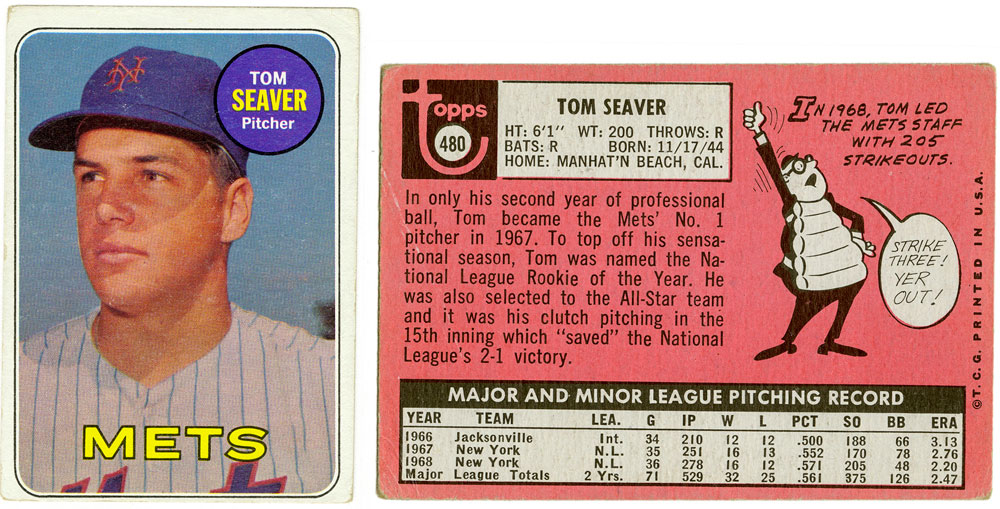America’s Pastime
 End of summer. Sad news arrives via the internet: a childhood hero—a baseball pitcher—passes away. At first, you feel bewilderment, then sadness, then salutary memory kicks in. You remember that terrific season, more than fifty years ago, when your hero led his team “from cellar to series.” That’s how the sportswriters described it. You remember a near-perfect game he pitched. You remember home runs—his home runs—because your hero was a pitcher who could hit. And you remember your hero’s baseball card from 1969. You owned it. You cherished it. Do you still have it?
End of summer. Sad news arrives via the internet: a childhood hero—a baseball pitcher—passes away. At first, you feel bewilderment, then sadness, then salutary memory kicks in. You remember that terrific season, more than fifty years ago, when your hero led his team “from cellar to series.” That’s how the sportswriters described it. You remember a near-perfect game he pitched. You remember home runs—his home runs—because your hero was a pitcher who could hit. And you remember your hero’s baseball card from 1969. You owned it. You cherished it. Do you still have it?
It must be stashed away in a shoebox with all those other baseball cards you had—somewhere in the basement. At some point you put them down there for safekeeping. That’s your memory of it anyway. When was the last time you looked at those cards? Long, long ago, but not so long as the distance your hero has just traveled. Oh how you want to see him again, just one more time. You want to find that baseball card. This will require a journey down into the basement. Descending is easy, but finding what you seek there isn’t.
Downward then, into the realm of must and mold!
In these depths a bare LED light bulb is the only source of illumination. It’s a cold blue light. Through the gloom you conduct your search for the hero’s image. His baseball card and the rest of them are laid away with the stuff called “family treasures.” The basement is a mephitic vault of memories. Some of the treasures are packed into boxes that sit on sagging shelves. Others are piled in heaps on the damp concrete floor. There’s method here, no organization. For decades things have been accumulating randomly. It’s an archivist’s nightmare. You really should wear a mask.
 Where to look for that shoebox? Perhaps it’s over there, behind those boxes stacked against the wall, the ones holding all your parents’ tax returns going back to 1946. Or maybe it’s inside that overstuffed canvas sack of old pet toys nobody could bring themselves to dispose of when “Muffy” disappeared in 1971. Or is it up there on that high shelf, between the dusty Hammond globe and the Wollensak reel-to-reel tape recorder? No, that box is empty. Wait! There it is! Further down on the same shelf, where the light hardly reaches. You extend your arms and retrieve the box. You hold it in your hands as you might a dreaming songbird.
Where to look for that shoebox? Perhaps it’s over there, behind those boxes stacked against the wall, the ones holding all your parents’ tax returns going back to 1946. Or maybe it’s inside that overstuffed canvas sack of old pet toys nobody could bring themselves to dispose of when “Muffy” disappeared in 1971. Or is it up there on that high shelf, between the dusty Hammond globe and the Wollensak reel-to-reel tape recorder? No, that box is empty. Wait! There it is! Further down on the same shelf, where the light hardly reaches. You extend your arms and retrieve the box. You hold it in your hands as you might a dreaming songbird.
Stop! This is not the right box. It’s the wrong color. Here in the chill light of the bare bulb you can make out your late mother’s handwriting on the shoebox lid. It reads: “Losing Lottery Tickets.” You open the lid. Inside is packed tight with orderly rows of—you guessed it—losing lottery tickets! The slips of paper are arranged in chronological order—one per week—starting in June 1992 and running to October 2005, a continuous log of hopes fostered and then dashed. Impressive as this evidence of your mother’s meticulousness is—especially in the shadow of so many numbers that did not come in—this is not what you were hoping for.
You keep poking around in the dim basement, looking for the image of your hero. You keep prying and rummaging as you breathe the unwholesome air. You spend an entire Labor Day weekend on this abysmal quest. Among other surprises, you come across grandfather’s railman lantern (he worked for the Erie), your late father’s last flight logbook (purchased from Sporty’s Pilot Shop), and your brother’s report card from first grade (dated 1968). Meaningful as these objects might be, they’re not what you seek. Thus you persevere through the Labor Day weekend, but come up short. No shoebox, no baseball cards, no sign of your hero. What now?
Well, there’s always the internet. And sure enough, one click and your hero’s image pops up on the screen. It’s the very baseball card you remember! Now you gaze into the monitor, waiting for the magic to happen, the magic that never arrived despite a three-day root around in the dismal basement. What do you want to happen? What are you really after?
To feel the same joy felt when you won Tom Seaver in a schoolyard game of “flipping” baseball cards. Instead, you’re looking into a computer monitor, staring at a death’s head.
©John P. O’Grady
Originally appeared in The Mountain Eagle on September 11, 2020



